Books - Geovisualization, Inequality and Space Research Group
Here is a full list of books by the Geovisualization, Inequality and Space research group in chronological order:
Seven Children: Inequality and Britain's Next Generation
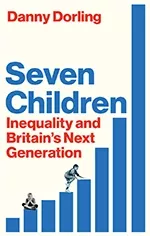
by Danny Dorling.
If we found seven typical 5-year-olds to represent today’s UK, what would their stories reveal? Seven Children is about injustice and hope. Danny Dorling’s highly original book constructs seven ‘average’ children from millions of statistics each child symbolising the very middle of a parental income bracket, from the poorest to the wealthiest. Dorling’s seven were born in 2018, when the UK faced its worst inequality since the Great Depression and became Europe’s most socially divided nation. They turned five in 2023, amid a devastating cost-of-living crisis. Their country has Europe’s fastest-rising child poverty rates, and even the best-off of the seven is disadvantaged. Yet aspirations endure.Seven Children gets to the heart of post-pandemic Britain’s most pressing issues. What do we miss when we focus only on the super-rich and the most deprived? What kinds of lives are British children living between the extremes? Why are most British parents on below-average income? Who are today’s real middle class? And how can we reverse the trends that are leaving all children worse off than their parents?
Shattered Nation: Inequality and the Geography of A Failing State
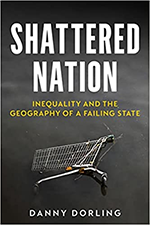 by Danny Dorling, Verso, 2023.
by Danny Dorling, Verso, 2023.
Britain was once the leading economy in Europe; it is now the most unequal. In A Shattered Nation, leading geographer and author of Inequality and the 1% shows that we are growing further and further apart. Visiting sites across the British Isles and exploring the social fissures that have emerged, Danny Dorling exposes a new geography of inequality. Middle England has been hit hard by the cost-of-living crisis, and even people doing comparatively well are struggling to stay afloat. Once affluent suburbs are now unproductive places where opportunity has been replaced by food banks. Before COVID, life expectancy had dropped as a result of poverty for the first time since the 1930s.
Slowdown: the end of the great acceleration - and why it's good for the planet, the economy, and our lives
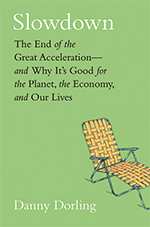 by Danny Dorling, Yale University Press, 2020.
by Danny Dorling, Yale University Press, 2020.
A powerful and counterintuitive argument that we should welcome the current slowdown - of population growth, economies, and technological innovation. Drawing from an incredibly rich trove of global data, this groundbreaking book reveals that human progress has been slowing down since the early 1970s. Danny Dorling uses compelling visualizations to illustrate how fertility rates, growth in GDP per person, increases in life expectancy, and even the frequency of new social movements have all steadily declined over the last few generations.
Finntopia: what we can learn from the world's happiest country
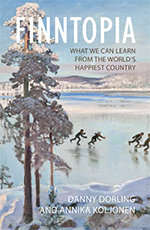 by Danny Dorling and Annika Koljonen, Agenda Publishing / Columbia University Press, 2020.
by Danny Dorling and Annika Koljonen, Agenda Publishing / Columbia University Press, 2020.
In the quest for the best of all possible societies, Danny Dorling and Annika Koljonen explore what we might learn from Finnish success and what they might usefully learn from us. In 2018, the World Happiness Report ranked Finland the world's happiest country, both for its total population and for the immigrants living there. The same occurred again in 2019. This book was published just as the 2020 results of that international study were due to be released.
Inequality and the 1%, 3rd Edition
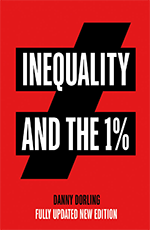 by Danny Dorling, Verso Books, 2019.
by Danny Dorling, Verso Books, 2019.
Fully updated new edition: Why we cannot afford the rich in post Brexit Britain. In Inequality and the 1% leading social thinker Danny Dorling lays bare the extent and true cost of the division in our society and asks what have the super-rich ever done for us? He shows that it is the 1% that threatens us with the most harm and why we must urgently redress the balance.
Rule Britannia: Brexit and the End of Empire
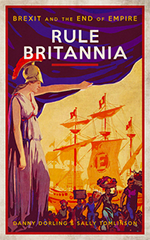 by Danny Dorling and Sally Tomlinson. Biteback Publishing, 2019.
by Danny Dorling and Sally Tomlinson. Biteback Publishing, 2019.
Things fall apart when empires crumble. This time, we think, things will be different. They are not. This time, we are told, we will become great again. We will not. In Rule Britannia, Danny Dorling and Sally Tomlinson argue that the vote to leave the EU was the last gasp of the old empire working its way out of the British psyche. Fuelled by a misplaced nostalgia, the result was driven by a lack of knowledge of Britain's imperial history, by a profound anxiety about Britain's status today, and by a deeply unrealistic vision of our future.
Peak Inequality: Britain's ticking timebomb
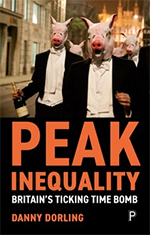 by Danny Dorling. Polity, 2018.
by Danny Dorling. Polity, 2018.
Inequality is the key political issue of our time. Danny Dorling wrote his seminal work Injustice: Why social inequality persists in 2010, and as an early proponent of rapidly reducing economic inequalities, he is now much sought-after as one of the foremost contributors to the debates surrounding it. Here Dorling brings together brand new material alongside a carefully curated selection of his most recent writing on inequality from publications as wide ranging as the Daily Telegraph, the Guardian, New Statesman, Financial Times and the China People's Daily.
Do we need economic inequality?
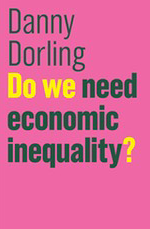 by Danny Dorling. Polity, 2018.
by Danny Dorling. Polity, 2018.
Although economic inequality provokes widespread disquiet, its supposed necessity is rarely questioned. At best, a basic level of inequality is seen as a necessary evil. At worst, it is seen as insufficient to encourage aspiration, hard work and investment, a refrain sometimes used to advocate ever greater inequality. In Do wee need economic inequality? Danny Dorling critically analyses historical trends and contemporary assumptions in order to question the idea that inequality is an inevitability.
Why Demography Matters
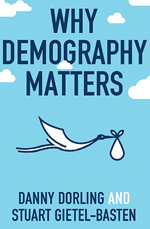 by Danny Dorling and Stuart Gietel-Basten. Polity, 2018.
by Danny Dorling and Stuart Gietel-Basten. Polity, 2018.
Demography is not destiny. As Giacomo Casanova explained over two centuries ago: 'There is no such thing as destiny. We ourselves shape our lives.' Today we are shaping our lives and our societies more than ever before. Globally, we have never had fewer children per adult: our population is about to stabilize, though we do not know when or at what number, or what will happen after that. It will be the result of billions of very private decisions influenced in turn by multiple events and policies, some more unpredictable than others.
The Equality Effect: Improving life for everyone
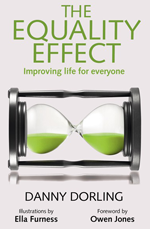 by Danny Dorling. New Internationalist, 2017.
by Danny Dorling. New Internationalist, 2017.
The Equality Effect is almost magical. In more equal countries, human beings are generally happier and healthier, there is less crime, more creativity and higher educational attainment. In The Equality Effect: Improving life for everyone Danny Dorling delivers all evidence that is now so overwhelming that it should be changing politics and society all over the world.
The Human Atlas of Europe: A continent united in diversity
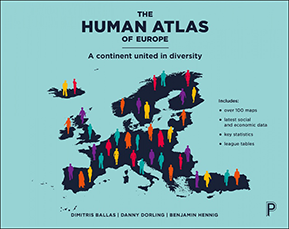 by Dimitris Ballas, Danny Dorling and Benjamin Hennig. Policy Press, 2017.
by Dimitris Ballas, Danny Dorling and Benjamin Hennig. Policy Press, 2017.
What does Brexit actually mean for the UK and what are the wider implications for Europe? Was the UK 'leave' vote actually symptomatic of broader issues within Europe such as population mobility and the rise of non-traditional parties? With maps covering over 80 topics ranging from life expectancy, greenhouse gas emissions, GDP to Eurovision voting, The Human Atlas of Europe addresses fundamental questions around social cohesion and sustainable growth as Europe negotiates the UK's exit while continuing through the economic crisis.
People and Places: A 21st-century atlas of the UK
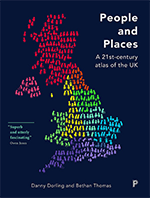 by Danny Dorling and Bethan Thomas. Policy Press, 2016.
by Danny Dorling and Bethan Thomas. Policy Press, 2016.
How can very recent UK trends in the years 2011-2015 be understood in the context of detailed maps of social change in the 10 years between 2001 and 2011? This unique atlas, the third in a bestselling series, uses a wealth of up-to-the minute data sources alongside 2011 Census data. It shows national and local trends and provides analysis of the implications of these for future policy. This is the only social atlas of the 2011 Census that explains so much about how all of the UK is changing.
Geography
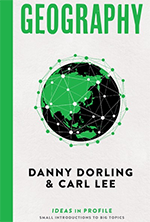 by Danny Dorling and Carl Lee. Profile Books, 2016.
by Danny Dorling and Carl Lee. Profile Books, 2016.
Geography ranges from globalisation to equality, from sustainability to population growth, from climate change to changing technology - and the complex interactions between them all. Exploration is driven by our innate curiosity; cartography is older than writing. Channeling our twin urges to explore and understand, geographers uncover the hidden connections of human existence, from infant mortality in inner cities to the decision-makers who fly overhead in executive jets, from natural disasters to over-use of fossil fuels.
A Better Politics: How Government Can Make Us Happier
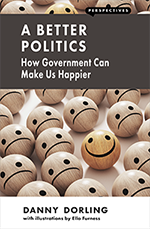 by Danny Dorling. London Publishing Partnership, 2016.
by Danny Dorling. London Publishing Partnership, 2016.
The aim of this book is to inspire a better politics: one that will enable future generations to be happier. While its publication coincides with the 500th anniversary of Thomas More's Utopia, its proposals are not a Utopian wish-list. They are, crucially, a set of policy suggestions that are already in place (or are being tested) elsewhere in Europe; proposals that address the issues that appear to matter most to people in the UK.
Injustice: Why social inequality persists
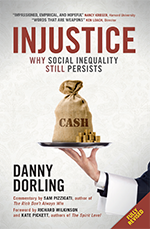 by Danny Dorling. 2nd Edition, Policy Press, 2015.
by Danny Dorling. 2nd Edition, Policy Press, 2015.
Few would dispute that we live in an unequal and unjust world, but what causes this inequality to persist? As the five social evils identified by Beveridge are gradually being eradicated, this book claims they are being replaced by five new tenets of injustice, viz: elitism is efficient; exclusion is necessary; prejudice is natural; greed is good; and despair is inevitable.
All That is Solid: The Great Housing Disaster
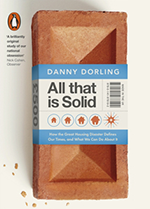 by Danny Dorling. Penguin, 2015.
by Danny Dorling. Penguin, 2015.
Housing was at the heart of the financial collapse, and our economy is now precariously reliant on the housing market. This ground-breaking book, argues that housing is the defining issue of our times. Tracing how we got to our current crisis and how housing has come to reflect class and wealth in Britain, All That Is Solid shows that the solution to our problems - rising homelessness, a generation priced out of home ownership - is not, as is widely assumed, building more homes. Inequality, it argues, is what we really need to overcome.
Inequality and the 1%
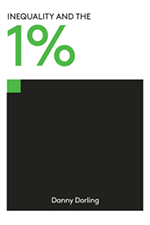 by Danny Dorling. Verso Books, 2014.
by Danny Dorling. Verso Books, 2014.
Inequality is more than just economics. It is the culture that divides and makes social mobility impossible. Danny Dorling goes in pursuit of the latest research into how the lives and ideas of the 1 percent impact the remaining 99 percent; and the findings are shocking. Inequality in the UK is increasing; more and more people are driven toward the poverty line. The mere accident of being born outside the 1 percent will have a dramatic impact on the rest of your life: it will reduce your life expectancy, as well as educational and work prospects, and affect your mental health.
The Social Atlas of Europe
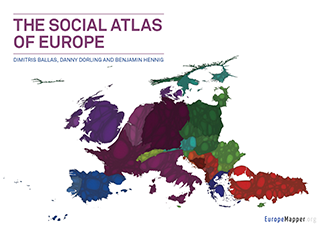 by Dimitris Ballas, Danny Dorling, Benjamin Hennig.
by Dimitris Ballas, Danny Dorling, Benjamin Hennig.
Many of us think of European countries as discreet entities-their own languages, cultures, food, and economies squarely contained within their national boundaries. But in fact Europe is at once a unified place and a sophisticatedly fragmented one, and national boundaries rarely reflect its social and economic realities. The social atlas of Europe is the first atlas to map Europe according to these realities, from the perspective of human geography rather than simply a political one. Using innovative full-color visualization methods, it reconsiders European identity through its many different facets: economy, culture, history, and human and physical geography, visualizing Europe and its people in a more fluid way, in some cases using maps without artificial national boundaries. It utilizes the latest available demographic, social, and economic data through state-of-the-art geographical information systems and new cartography techniques. Through these new visualizations, this highly illustrated book offers fresh perspectives on a range of topics, including social values, culture, education, employment, environmental footprints, health and well-being, and social inequalities and cohesion. It is a bold rethinking of Europe as we know it and will be of interest to anyone who wants to understand the continent in its truest form.
Population 10 Billion
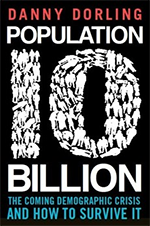 by Danny Dorling. Constable & Robinson, 2013.
by Danny Dorling. Constable & Robinson, 2013.
An in depth examination of the impact that a global population of 10 billion will have on the planet and how we will have to adapt to cope with it. Before May 2011 the top demographics experts of the United Nations had suggested that world population would peak at 9.1 billion in 2100, and then fall to 8.5 billion people by 2150. In contrast, the 2011 revision suggested that 9.1 billion would be achieved much earlier, maybe by 2050 or before, and by 2100 there would be 10.1 billion of us. What's more, they implied that global human population might still be slightly rising in our total numbers a century from now. So what shall we do? Are there too many people on the planet? Is this the end of life as we know it?
More information forthcoming.
Back to the Geovisualization, Inequality and Space Research Group.
For further information please contact Prof Danny Dorling




